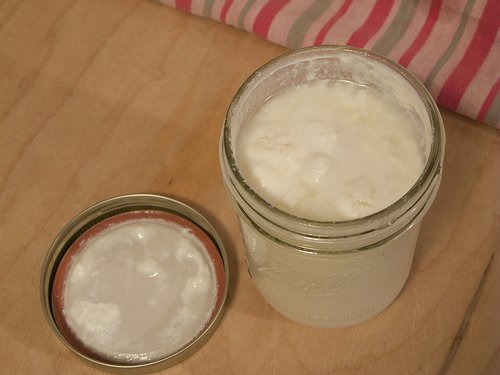
“We tend to take our gut for granted, and it costs us dearly. We continually eat wrong foods that are rarely digested properly. The by-products of incomplete digestion clog the gut with accumulated debris. This coating becomes a perfect breeding ground for dangerous forms of bacteria and other microorganisms.” Jordan Rubin, The Maker’s Diet
I’ve been sharing lately about the GAPS diet for gut health, and why our family is doing it. Nonetheless, it’s not for everybody, or certainly not in every season of life. I know that many families are just working towards better eating habits in general.
What is worthwhile for anyone to consider, however, is how you can improve your crucially important digestive system and the overall health of your gut. It doesn’t have to be fancy or all-consuming, nor does it require you to fork out money for supplements promising you this or that.
Want to feel better by improving your digestion, reducing overgrowths of bad bacteria and yeast, increasing growth of good bacteria, encouraging better absorption of nutrients and aiding your body in dealing with toxins?
Here is a list of practical and simple ways that anyone can improve their gut health:
Drink less with meals.
When you drink a lot during a meal, it dilutes the levels of hydrchloric acid in your stomach. Without sufficient HCL, digestion can not proceed quickly or smoothly. Try to have your drinks at least 30 minutes before, or 30-60 minutes after you eat.
Additionally, beverages that are room temperature are easier on the digestive system than really cool drinks, so skip the ice if you can (and knowing this, I still drink cold smoothies, but I do try to have most of my other beverages sans ice).
Have fermented foods with or just before your meals.
As a rich source of enzymes, naturally fermented foods help to break down what we eat, in addition to boosting the good bacteria count in our bodies. A few examples are kefir or yogurt, kombucha, sour cream or creme fraiche, fermented veggies (lacto-fermented pickles or salsa, sauerkraut) and any other food that is naturally lacto-fermented or made using live bacterial cultures.
Try adding just one or two fermented and/or cultured foods to your family’s repertoire. For some helpful resources, see Health Benefits of Fermented Foods, Proactive Probiotic Foods, and Baby Steps: Eating Cultured and Fermented Foods.
Add homemade bone broths to your diet and try to include them in meals as often as you can.
Use them in soups and stews, in gravies, in pasta sauces, in casseroles and pot pies, or even drink them by the mug with or in between your meals. Truly healing and soothing to the gut, bone broths are a frugal homemakers best friend on the road to better health. Broths are cheap and easy to make, and when made correctly, are powerhouses of gut-healing gelatin and other nourishing nutrients.
Take probiotics.
I don’t recommend too many supplements, because I prefer to get my nutrition from whole foods. However, there are two that I regularly recommend and they are cod liver oil and a good quality probiotic. You might have heard of acidophilus, which is just one of the many beneficial bacteria strains that we want to populate our gut.
For many reasons due to our North American diets, chlorinated water, antibiotic use and more, we need to be proactive about repopulating our gut with these friendly little bacteria, who do so much more in our bodies than we really give them credit for. I love Primal Defense from Garden of Life, but there are many excellent ones out there. Ask a reputable health store for their recommendation.

Image by norwichnuts
Eat less refined sugar and grains.
We should be aiming for this anyways, but particularly for gut health. These sugars and refined carbohydrates really feed the growth of yeast like Candida and other bad bacteria in the digestive tract. Bad news for our gut health. Really bad.
These are a huge part of the reason why we have to work so hard to rebalance our gut bacteria so that the good guys win out. Cutting these refined foods out is a major step in the battle for gut health.
Start your morning with a glass of lukewarm water with fresh lemon juice or apple cider vinegar.
This gives your digestive system a gentle jump start and prepares it for the food that you will start your day off with. Starting your morning with smoother digestion goes a long way towards a better functioning system overall.
Try hydrochloric acid or digestive enzymes.
For those really struggling with poor digestive health, but still not ready to make major dietary changes, this one is for you. Most people with digestive/gut issues have insufficient stomach acid (hydrochloric acid) to break down foods, and most of us do not eat enough live enzymes through raw or fermented/cultured foods to help that process along.
Taking hydrochloric acid supplements, and/or digestive enzymes, can help your stomach to at least begin the process of breaking down the foods that you eat. The rest of your gut may still be imbalanced, but the more effectively that your stomach is able to work at properly breaking down foods before they enter the rest of the digestive tract, the better.
Listen to your body.
If something you eat seems to throw off your digestion (as evidenced by symptoms like heartburn, gas, bloating, cramping, diarrhea, etc. even if the symptoms are mild), take a break from that food. Give your body a longer rest before you eat another meal, rather than adding to an already upset system.
Try to avoid overeating as this really taxes the digestive system and usually results in food that is not being properly digested. Use caution and common sense, even if it means saying no to something you’d really like to eat (yes, I do know that this is hard, but your body will thank you!).
When digestive upset occurs…
Ginger tea can be an excellent remedy, as it is very soothing to the system and aids in digestion. Another great option is peppermint tea, or a few drops of peppermint essential oil in a glass of warm or lukewarm water.
Is digestive health something that you consciously think about? What small steps do you take to maintaining good gut health?
Disclosure: This post includes affiliate links.
Original article and pictures take keeperofthehome.org site
Комментариев нет:
Отправить комментарий